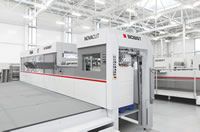With his extensive knowledge of plastics packaging – both at MCG and earlier at Mega Plastics – he’s ideally qualified for the task of managing this multifaceted business, which ranks among the top players in South Africa’s multi-billion-rand plastics packaging sector.
Serving blue-chip customers in the food and beverage, household, personal care and pharmaceutical markets, Mpact’s Plastics business accounts for an impressive 27.5% of Mpact’s groupwide revenue, and 16% of overall profit.
This division of JSE-listed Mpact consists of eight manufacturing sites, divided into four distinct business clusters – PET preforms, bottles, jars and closures in Wadeville (Gauteng); FMCG in Pinetown (KwaZulu-Natal) and Atlantis (Western Cape); Mpact Versapak in Paarl (Western Cape) and Harare (Zimbabwe); and Mpact Plastic Containers in Atlantis (Western Cape) and Brits (North West).
So what exactly is meant by ‘realigning goals? What’s on the cards?
Firstly, some amalgamation has already resulted in more sustainable manufacturing. For example, the Robertville operation has been consolidated into the Wadeville and Pinetown plants.
‘Notwithstanding the challenging business environment, we believe our PET/closures and FMCG clusters have a bright future, and we’ll continue to invest in these businesses to meet growing market demand,’ Neelin comments. ‘Ongoing expansion and improvements will ensure that we’re delivering the very best quality and innovation for our customers.’
Secondly, in line with Mpact’s maxim to deliver ‘smarter sustainable solutions’, there’s continuing investment in the refinement of environmental policies and practices.
‘As a substrate, plastics show excellent promise – in some sectors taking market share from traditional materials such as glass and metal,’ Neelin explains. ‘But crucial to future growth is the creation of a positive message about plastics packaging,’ he insists. ‘To this end, Mpact is playing an active role in a number of consumer and corporate initiatives, in conjunction with industry associations such as PlasticslSA, Packaging SA, POLYCO (Polyolefin Recycling Company) and the Polystyrene Packaging Council.
A third leg to the realignment plan is a growing emphasis on synergies with other Mpact businesses.
‘Coming from an independently-owned enterprise before joining the Mpact team, I’m deeply aware of the significant parenting advantages of Mpact group businesses,’ Neelin comments.
As an example, he cites Mpact’s R350-million investment in a PET recycling plant in Wadeville, close to its world-class PET production site. ‘When opened later this year, this recycling plant will provide us with enough recycled PET to service future production requirements,’ Neelin reports. ‘This is one example of the way we’re maximising our resources to ensure we’re meeting and exceeding customers’ requirements for the highest service and product quality, innovation and cost competitiveness.’









![02 CAE 20th Anniversary [2018] ED](https://www.packagingmag.co.za/wp-content/uploads/2024/11/thumbs/epic-120x86/02_CAE-20th-Anniversary-2018-ED-120x86.jpg)